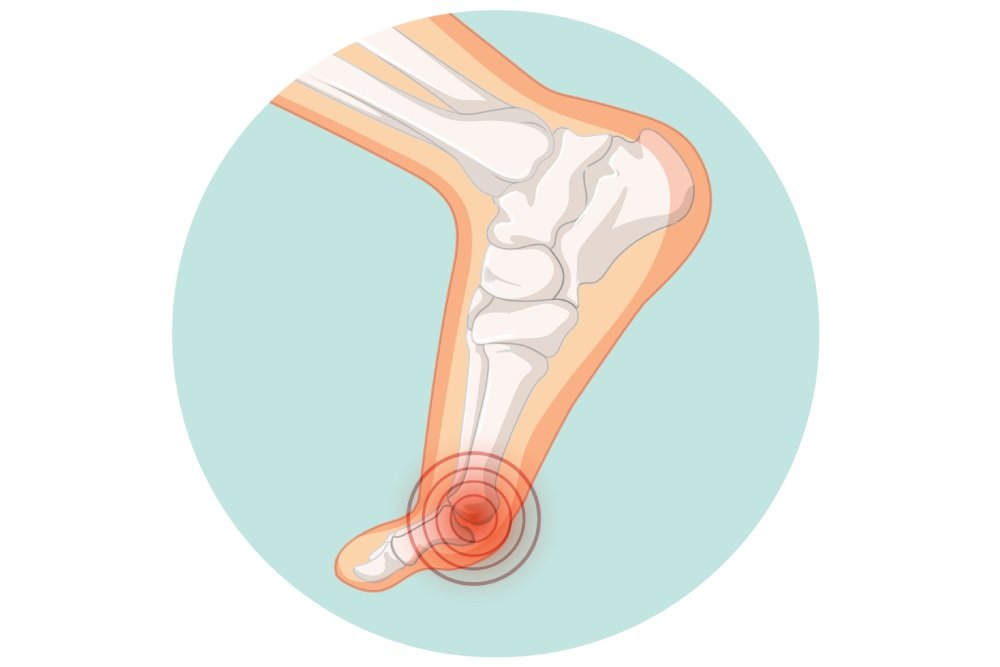
Arthritis
Understanding Foot and Ankle Arthritis
Arthritis is a condition characterized by inflammation and stiffness of the joints. In the feet and ankles, arthritis can affect any joint, including those in the toes, midfoot, hindfoot, and ankle joint itself. The most common types of arthritis affecting the foot and ankle are osteoarthritis and rheumatoid arthritis. Dr. Mithun Sivadasan, serving areas in Monmouth County including Belford, Lincroft, Hazlet, and Holmdel, can evaluate you for this condition.
Common Causes of Foot and Ankle Arthritis
- Osteoarthritis: Caused by wear and tear on the joints over time, leading to degeneration of cartilage and bone.
- Rheumatoid Arthritis: An autoimmune disorder where the immune system attacks the joints, causing inflammation and joint damage.
- Post-Traumatic Arthritis: Develops after an injury, such as a fracture or severe sprain, that damages the joint surfaces.
- Gout: A form of arthritis caused by the buildup of uric acid crystals in the joints, often affecting the big toe.
Symptoms of Foot and Ankle Arthritis
- Pain: Persistent discomfort in the affected joint, worsened by activity.
- Stiffness: Difficulty moving the joint, especially in the morning or after periods of inactivity.
- Swelling: Inflammation and swelling around the joint.
- Difficulty Walking: Pain and stiffness can impair mobility and balance.
- Deformities: In advanced cases, arthritis can lead to joint deformities or changes in the shape of the foot or ankle.
Diagnosing Foot and Ankle Arthritis
If you suspect foot or ankle arthritis, it’s essential to consult with a qualified foot doctor at Middletown Foot & Ankle. Our podiatrist, specializes in diagnosing arthritis through a comprehensive evaluation, which may include imaging tests like X-rays or MRI to assess joint damage and rule out other conditions.
Treatment Options
Effective management of foot and ankle arthritis aims to relieve pain, reduce inflammation, and preserve joint function:
- Medications: Nonsteroidal anti-inflammatory drugs (NSAIDs), corticosteroids, or disease-modifying antirheumatic drugs (DMARDs) may be prescribed to manage pain and inflammation.
- Physical Therapy: Exercises to improve joint range of motion, strengthen muscles around the joint, and enhance overall mobility.
Orthotics and Supportive - Devices: Custom orthotic inserts, braces, or shoe modifications to alleviate pressure on the joints and provide support.
- Injections: Corticosteroid injections or hyaluronic acid injections directly into the joint to reduce pain and improve function.
- Surgery: In severe cases where conservative treatments fail, surgical options such as joint fusion, joint replacement (arthroplasty), or joint repair may be considered.
Lifestyle Modifications and Prevention
- Maintain a Healthy Weight: Excess weight can strain joints and worsen arthritis symptoms.
- Low-Impact Exercise: Engage in activities like swimming or cycling to maintain joint flexibility and strengthen muscles.
- Proper Footwear: Wear supportive shoes with cushioning and shock absorption to reduce stress on the joints.
- Joint Protection: Avoid activities that exacerbate joint pain and consider using assistive devices or adaptive techniques.
Visit Middletown Foot & Ankle
If you’re experiencing symptoms of foot and ankle arthritis, don’t delay seeking professional care at Middletown Foot & Ankle. Our board certified podiatrist specialize in treating arthritis. Contact us today at 732-790-5599 to schedule an appointment or learn more about how we can help you manage arthritis and improve your foot health.
